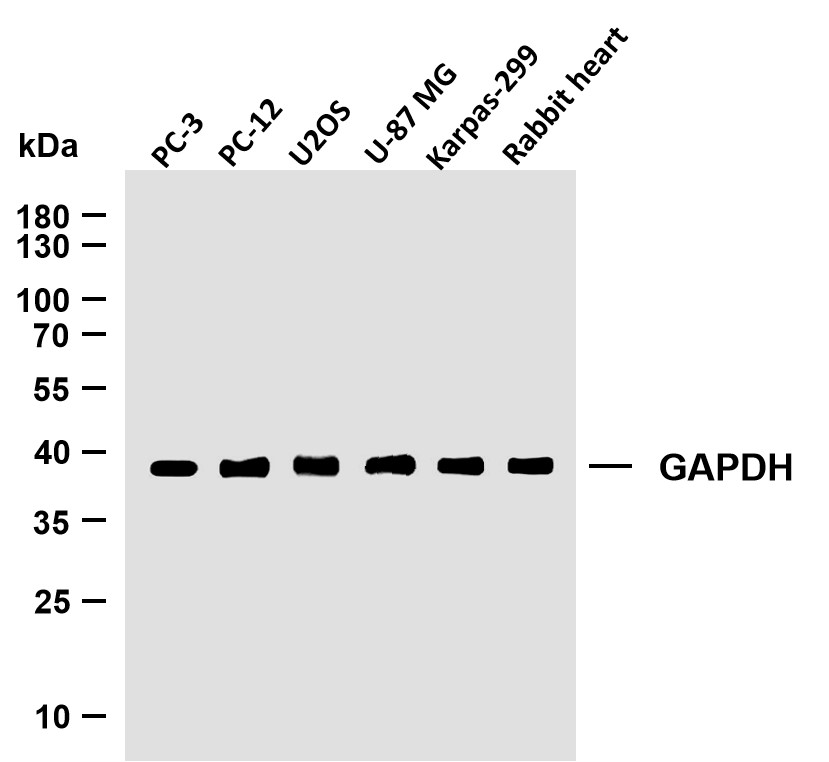
Catalog: IHCM6142
Size
Price
Status
Qty.
100mL
$2,960.00
3 weeks
0
10mL
$356.00
3 weeks
0
3mL
$156.00
3 weeks
0
Add to cart


Collected


Collect
Main Information
Target
Actin_Muscle Specific
Host Species
Mouse
Reactivity
Human, Mouse, Rat, Monkey, Bovine, Pig, Chicken
Applications
IHC
Conjugate/Modification
Unmodified
Detailed Information
Specificity
The antibody can specifically recognize proteins from smooth muscle, myocardium and skeletal muscle α actin and smooth muscle derived γ actin, and β actin or non smooth muscle derived γ actin does not respond.
Purification
The antibody was affinity-purified from ascites by affinity-chromatography using specific immunogen.
Storage
2°C to 8°C/1 year,Ship by ice bag
Modification
Unmodified
Clonality
Monoclonal
Clone Number
ABT-MSA
Isotype
IgG1,Kappa
Related Products
Antigen&Target Information
Immunogen:
Synthesized peptide derived from human Actin, Muscle Specific AA range: 2-50
show all
Specificity:
The antibody can specifically recognize proteins from smooth muscle, myocardium and skeletal muscle α actin and smooth muscle derived γ actin, and β actin or non smooth muscle derived γ actin does not respond.
show all
Gene Name:
ACTA1;ACTA2;ACTC1;ACTG2
show all
Protein Name:
α-Skeletal Muscle Actin (α-SA);α-Cardiac Muscle Actin (α-CA);α-Smooth Muscle Actin (α-SMA);γ-Smooth Muscle Actin (γ-SMA);
show all
Background:
Actins are highly conserved proteins that are involved in various types of cell motility. Polymerization of globular actin (G-actin) leads to a structural filament (F-actin) in the form of a two-stranded helix. Each actin can bind to four others. The protein encoded by this gene belongs to the actin family which is comprised of three main groups of actin isoforms, alpha, beta, and gamma. The alpha actins are found in muscle tissues and are a major constituent of the contractile apparatus. Defects in this gene have been associated with idiopathic dilated cardiomyopathy (IDC) and familial hypertrophic cardiomyopathy (FHC). [provided by RefSeq, Jul 2008],
show all
Function:
Disease:Defects in ACTC1 are the cause of cardiomyopathy dilated type 1R (CMD1R) [MIM:102540]. Dilated cardiomyopathy is a disorder characterized by ventricular dilation and impaired systolic function, resulting in congestive heart failure and arrhythmia. Patients are at risk of premature death.,Disease:Defects in ACTC1 are the cause of cardiomyopathy familial hypertrophic type 11 (CMH11) [MIM:612098]. Familial hypertrophic cardiomyopathy is a hereditary heart disorder characterized by ventricular hypertrophy, which is usually asymmetric and often involves the interventricular septum. The symptoms include dyspnea, syncope, collapse, palpitations, and chest pain. They can be readily provoked by exercise. The disorder has inter- and intrafamilial variability ranging from benign to malignant forms with high risk of cardiac failure and sudden cardiac death.,Function:Actins are highly conserved proteins that are involved in various types of cell motility and are ubiquitously expressed in all eukaryotic cells.,miscellaneous:In vertebrates 3 main groups of actin isoforms, alpha, beta and gamma have been identified. The alpha actins are found in muscle tissues and are a major constituent of the contractile apparatus. The beta and gamma actins coexist in most cell types as components of the cytoskeleton and as mediators of internal cell motility.,similarity:Belongs to the actin family.,subunit:Polymerization of globular actin (G-actin) leads to a structural filament (F-actin) in the form of a two-stranded helix. Each actin can bind to 4 others.,
show all
Cellular Localization:
Cytoplasmic
show all
Tissue Expression:
show all
Research Areas:
>>Cardiac muscle contraction ;
>>Adrenergic signaling in cardiomyocytes ;
>>Hypertrophic cardiomyopathy ;
>>Dilated cardiomyopathy
>>Adrenergic signaling in cardiomyocytes ;
>>Hypertrophic cardiomyopathy ;
>>Dilated cardiomyopathy
show all
Signaling Pathway
Organismal Systems >> Endocrine system >> Relaxin signaling pathway
Organismal Systems >> Circulatory system >> Cardiac muscle contraction
Organismal Systems >> Circulatory system >> Adrenergic signaling in cardiomyocytes
Organismal Systems >> Circulatory system >> Vascular smooth muscle contraction
Environmental Information Processing >> Signal transduction >> Apelin signaling pathway
Reference Citation({{totalcount}})
Catalog: IHCM6142
Size
Price
Status
Qty.
100mL
$2,960.00
3 weeks
0
10mL
$356.00
3 weeks
0
3mL
$156.00
3 weeks
0
Add to cart


Collected


Collect
Recently Viewed Products
Clear allPRODUCTS
CUSTOMIZED
ABOUT US
Toggle night Mode
{{pinfoXq.title || ''}}
Catalog: {{pinfoXq.catalog || ''}}
Filter:
All
{{item.name}}
{{pinfo.title}}
-{{pinfo.catalog}}
Main Information
Target
{{pinfo.target}}
Reactivity
{{pinfo.react}}
Applications
{{pinfo.applicat}}
Conjugate/Modification
{{pinfo.coupling}}/{{pinfo.modific}}
MW (kDa)
{{pinfo.mwcalc}}
Host Species
{{pinfo.hostspec}}
Isotype
{{pinfo.isotype}}
Product {{index}}/{{pcount}}
Prev
Next
{{pvTitle}}
Scroll wheel zooms the picture
{{pvDescr}}



















